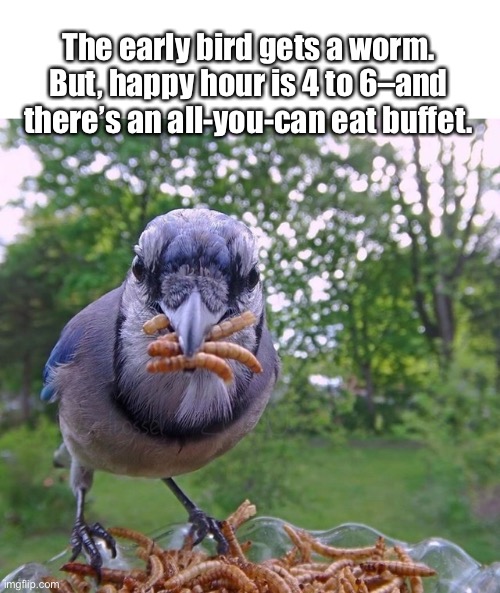

Don’t rush too much.the snail got to the ark eventually.

It’s true the early bird catches the worm but it’s also true the late worm avoids getting eaten by the early bird. The early bird gets the worm but the worm that sleeps in doesn’t get eaten The early bird gets the worm, but the early worm got eaten. ĥ:15 AM - 28 Oct Early Bird Gets The Worm, But The Early Worm Gets Eaten. Will 🇳🇱 “the early bird gets the worm”, But the early worm gets eaten… Sincerely, sleeping in. The early birds gets the worm, and the early worm gets early bird eats the worm, but the early worm gets eaten.” So, should I get up early and go to yoga tomorrow morning?Īaron but then again the late worm doesn’t get eaten by the early bird. The early bird gets the worm, but the early worm gets eaten. 3:Ī Library of the Literature and History of Humor Containing Thousands of Gags, Sayings, and Stories The early bird gets the worm, but on the other hand the early worm gets eaten.Ħ September 1910, Guthrie (OK) Daily Leader, pg. 2:Ģ6 August 1910, Rock Island (IL) Argus, pg. ģ November 1897, Puck (New York, NY), pg. Many of our maxims and aphorisms are decidedly contradictory for instance, the example held on to us of the early bird is somewhat upset by the fact that ‘the early worm gets eaten ’. This is first recorded in John Ray’s A collection of English proverbs 1670, 1678:ĩ April 1887, Chambers’s Journal of Popular Literature, Science and Arts, pg. Success comes to those who prepare well and put in effort. “The early bird may get the worm, but the second mouse gets the cheese” is a related saying.

The saying has been printed on several images. “The early bird may get the worm, but the early worm gets eaten.” The New York City humor magazine Puck published on November 3, 1897: “Many of our maxims and aphorisms are decidedly contradictory for instance, the example held on to us of the early bird is somewhat upset by the fact that ‘the early worm gets eaten.” However, what about the worm?Ĭhambers’s Journal printed in April 1887: "The early bird catches the worm” is a proverb dating from at least the 17th century it means that whoever does something first has the best chance of success.


 0 kommentar(er)
0 kommentar(er)
